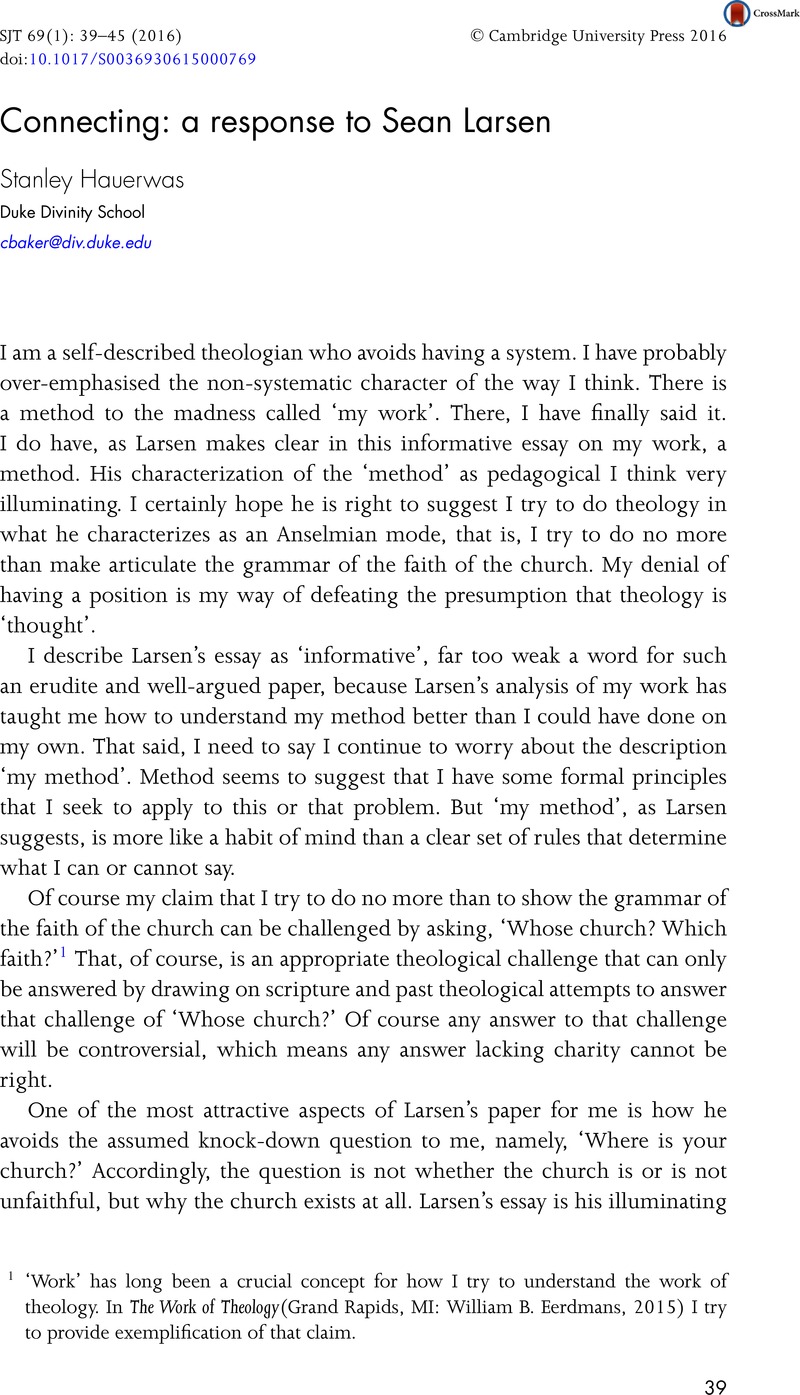No CrossRef data available.
Article contents
Connecting: a response to Sean Larsen
Published online by Cambridge University Press: 25 January 2016
Abstract

- Type
- Reply
- Information
- Copyright
- Copyright © Cambridge University Press 2016
References
1 ‘Work’ has long been a crucial concept for how I try to understand the work of theology. In The Work of Theology (Grand Rapids, MI: William B. Eerdmans, 2015) I try to provide exemplification of that claim.
2 I am very good at hiding what I have written about my self-understanding of how I have tried to work. Larsen has, however, discovered a number of those essays. In particular I think my essay, ‘Connecting Some of the Dots, or an Attempt to Understand Myself’, is not a bad place to start. It is an appendix to my Cross-Shattered Christ: Reclaiming the Theological Heart of Preaching (Grand Rapids, MI: Baker, 2010), pp. 144–56.
3 Hauerwas, Stanley, Sanctify Them in the Truth: Holiness Exemplified (Edinburgh: T&T Clark, 1998), pp. 1–15Google Scholar.
4 See Healy, Nicholas, Hauerwas: A (Very) Critical Introduction (Grand Rapids, MI: William B. Eerdmans, 2014)Google Scholar.
5 See e.g. my Working with Words: On Learning to Speak Christian (Eugene, OR: Cascade Press, 2011).
6 In The Work of Theology I try to provide a more expansive account of how I understand theology as a form of practical reason.
7 Hauerwas, Stanley, ‘Making Connections: By Way of a Response to Wells, Herdt, and Tran’, in Collier, Charles (ed.), The Difference Christ Makes: Celebrating the Life, Work, and Friendship of Stanley Hauerwas (Eugene, OR: Cascade Books, 2015), pp. 77–94Google Scholar.
8 For my response to Hartt see my Christian Existence today: Essays on Church, World, and Living in between (Grand Rapids, MI: Brazos Press, 2001), pp. 44–5.
9 One of my books that I regret has never attracted interest is Wilderness Wanderings: Probing Twentieth-Century Theology and Philosophy (Boulder, CO: Westview Press, 1997). In that book I tried to develop the understanding of time and history that I should like to think is crucial for understanding the way I work.
10 That little essay was first published in my Dispatches from the Front: Theological Engagements with the Secular (Durham, NC: Duke University Press, 1994), pp. 153–5.
11 Calhoun, Robert, Scripture, Creed, Theology: Lectures on the History of Christian Doctrine in the First Centuries, edited with an introduction by Lindbeck, George (Eugene, OR: Cascade Press, 2011)Google Scholar On pp. xix–xx of his ‘Introduction’ Lindbeck quotes Frei's wonderful in memorium to Calhoun in which Frei observed that Calhoun taught his students not to be afraid of the word ‘dogma’ by helping them see that ‘orthodoxy’ is the name of a broad consensus within an every growing and living tradition. Accordingly,Schleiermacher must be included in that consensus as one who helps Christians recognise they have been freed from unwarranted fears of secular thought and from a hopeless passion for ideal linguistic purity to recognise that from the beginning Christianity has been a language-shaping force.




